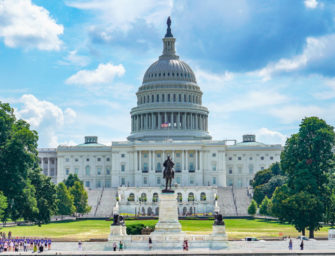Use Your Voice to Make the State of Our Union Stronger
Last night, under the cloud of a delay resulting from the longest shutdown in the history of the United States federal government, President Donald Trump delivered the second state of the union address of his presidency. As in 2018, he again failed to acknowledge the role scientific research plays in advancing our society and economy.
Earlier this morning, I issued my own response to the President’s State of the Union, highlighting a few ways our elected leaders can lean on science to make the state of our union stronger. I encourage you to watch the video and to share it with your social media networks.
My voice can’t be the only one speaking out about threats science faces. It is critically important that you make your voice heard as well.
I urge you to contact your member of Congress today to tell them why it is so very important that they stand up for science.
Tell them that science is essential to public health and well-being, our resilience to natural disasters, our ability to develop 21st century infrastructure, and our ability to better predict and mitigate the effects of climate change.
Government shutdowns imperil the integrity of the scientific enterprise. Tell them that the uncertainty caused by underfunding and shutdowns is threatening science’s ability to benefit the public and to attract the best and brightest into science. Tell them that science takes no sides, has no borders, and claims no party.
Tell them that the state of our union would be stronger if we renewed our commitment as a nation to a stable, consistent, and growing investment in science.



Dear Chris,
I share your thoughts and concern related to the appreciation of science, research and innovation by the current U.S. Administration. As AGU and the International Union of Geodesy and Geophysics (IUGG) celebrate in 2019 their common 100th anniversary and we are looking back to the history of both organizations and history of science to develop a better future for science, you could see the evolution of science perception by national governments. Let me bring you back to 1939, September 1: Germany invaded Poland and the Second World War (WWII) began. At the same time Washington D.C. welcomed more than 800 scientists from more than 30 countries at the 7th IUGG General Assembly. Honorable Cordell Hull, U.S. Secretary of State, sent a welcoming address, and at the close of the General Assembly, the U.S. President Franklin D. Roosevelt received AGU and IUGG officers in the White House (e.g., Nature, 144, 717-18, 1939; Science, 91, 439-42, 1940). Could you just imagine how busy was the president of the great country at the beginning of WWII? But despite this, he found time to speak to international scientists and to ensure that science is in his heart … And 80 years later, December 2018. 28,000+ scientists from all over the world gathered in Washington D.C. at the AGU Fall Meeting to present and discuss new discoveries and to celebrate scientific achievements. And nobody from the White House or the Department of State welcomed the scientists. That is a modern appreciation of science, and, very unfortunately, but this occurs in many countries, not only in USA. Something should be wrong here. Indeed, we, scientists, should make all possible efforts to convince our governments and the representatives of state legislation about the importance of scientific research and convince them to stand up for science.
Sincerely,
Alik Ismail-Zadeh
IUGG, Secretary General
International Science Council, Secretary of Council
Science is indeed important to our nation. Both parties are treating science as a pawn in their negotiations. AGU is wrong to over-personalize the issue and blame only the chief executive. Extending the wall is a reasonable demand and Congress should support it.